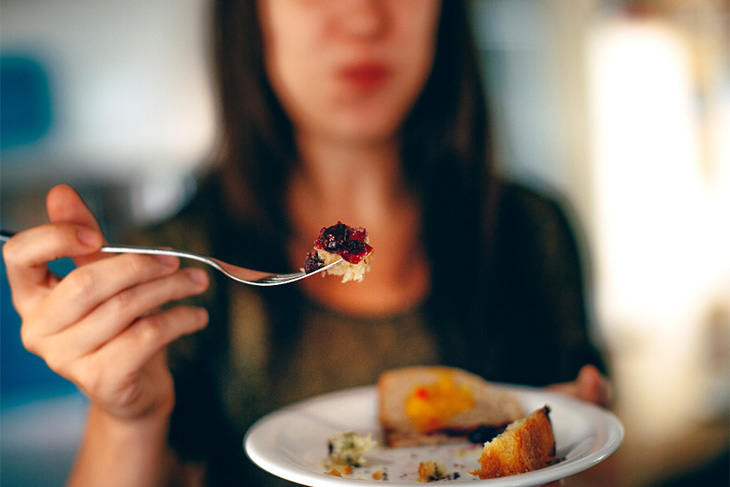How to manage emotional eating

Emotional eating is something all of us will face at one point in our lives. We deal with our emotions on a day-to-day basis and there are going to be times when these emotions are much higher than normal. This could be the result of anything from work stress to financial stress to a disagreement with a friend or partner.
The difference is in how each person reacts to stress. Some people may lose their hunger and not eat in a time of stress, but for others, their default reaction to stress is to find food and seek comfort in this food.
To better understand what emotional eating is and how we can manage it, we spoke with the CSIRO Total Wellbeing Dietitian Pennie McCoy. Here is her advice.
What is emotional eating?
"Emotional eating is when a person uses food as a resource to control their emotions," explains Pennie.
"Foods that we tend to go for when we emotionally eat are often foods that are high in fat and salt, or high in sugar – they’re really highly processed. And while this gives us immediate satisfaction when we eat the food, the consequences of long-term exposure to this type of behaviour is not necessarily satisfaction."
The dangers of stress eating
When we get stressed the body produces a number of biological responses. For those that experience chronic stress, the release of cortisol is increased which has a number of effects on the body. When cortisol is released it provides a surge of energy that is responsible for controlling your body's use of fats, proteins, carbohydrates, and even your metabolism. Unfortunately, this response is also associated with increasing appetite which is can come in the form of a desire for sweets. This, in turn can create a number of unhealthy risks.
Creating negative habits
Stress eating can be a difficult habit to break and part of that is due to the cyclical habits that it can form. Indulging in comfort foods can often lead to a sense of guilt. In turn, the guilt may cause an increase in overall stress which leads to an increase in emotional eating. Additionally, stress eating involves indulging in sugary snacks which activates reward triggers in our brains further cementing the behaviour.
Weight gain
Weight is lost when there is a deficit of kilojoules (kJ) consumed vs. what is exerted throughout the day. When we stress eat we are consuming more or extra kJ than our bodies require which means it is common to see an increase in our weight.
Health issues
Over time, the excessive consumption of foods will result in weight related health complications. This might include high blood pressure, diabetes, heart disease and more. These health issues create additional wear and tear on the body that could be avoided if the proper steps are taken to manage emotional eating.
Negative self image
As mentioned previously, indulging in stress eating may result in a feeling of guilt that can persist well beyond just after stress food is consumed. This feeling of guilt can result in a long term degradation of self worth. A negative self image, whether you are experiencing weight gain for the first time or are regaining previously lost weight, may manifest from any of the associated dangers of stress eating and help to further the cyclical behaviours of emotional eating.
Because of these risks, it is important to not only recognise when we stress eat, but also to understand the cause of our stress. By increasing our overall awareness we can hope to minimise cravings when they do occur by practicing healthier habits to cope with stress.
What causes emotional eating?
There are many reasons why someone might turn to food for comfort. It could be that it was ingrained during childhood when parents used food as a reward for positive behaviour, or alternatively, when parents used food to stop a child from acting out or from bad behaviour.
It is also possible that this is learned behaviour from adulthood. Food often serves as a distraction so if someone is worried or upset about something, they may choose to focus on food instead of dealing with the situation at hand. If this is done enough times it will become the default reaction to this type of stress.
"For some people, when they’re feeling anxious and their anxiety is building, they just want to go and grab snack foods like salty crisps or lollies to try to reduce that anxiety," said Pennie.
"For others, it might be stress related in terms of uncertainty and feeling overwhelmed. It might even be that someone is so overwhelmed they don’t know what to do so they throw in the towel and go to the pantry."
How can we stop emotional eating?
If you're someone struggling with emotional eating, Pennie suggests you try these steps to change your behaviour.
Identify your emotions
First and foremost, you need to identify what emotions are triggering comfort eating.
"Check in with yourself and ask how you are feeling right now and notice what your emotions are. If you can notice your emotions before they become really heightened, you can try to intervene before it becomes problematic," explains Pennie.
Consider keeping a diary of your emotions and the times you feel compelled to eat and you might see a pattern emerge.
Try breathing and meditation
"Breathing is something we take for granted, but in times of high emotion, your breathing increases and your heart rate goes up," explains Pennie.
"Put in place some strategies around breathing, maybe download an app with breathing exercises or take up meditation to help your body reset and get the oxygen flowing again before you head to the kitchen."
Substitute behaviour
Rather than reaching for food for your emotions, create yourself a list of 10 different activities that you can do when you feel your emotions rising and you need to reset the balance.
These activities could include any of the following:
- Five minutes of exercise at home
- Stretching
- Yoga
- A walk around the block
- Body weight exercises in the park
- Colouring in
- A jigsaw, sudoku or crossword
- Knitting
- Reading a book
- Calling a friend
- Journaling
- Going on social media if you have a supportive group
- Having a bath
- Watching a movie
- Listening to music
- Playing with your pet.
It’s all about finding strategies that occupy your time and reduce those emotions back to a more normal level to avoid comfort eating.
"Know that it might not work the first time you attempt to do this," warns Pennie. "You might need to try multiple things and work through your entire list of strategies to find something that works for you. Just as emotions are such a personal thing, so too are the strategies that will help you get through this."
Speak with a dietitian
If you've tried everything above and you are still struggling to control your emotional eating, consider speaking to a professional.
The CSIRO Total Wellbeing Diet has Accredited Practising Dietitians who conduct online sessions with our members to help them through their wellbeing journey.
Find a balance
While reaching for food on a regular basis to deal with your emotions can have a negative impact on your health, Pennie stresses that it is important to remember that sometimes food can be used in a positive way.
“Having a glass of wine to celebrate an achievement or eating cake at a friend’s birthday party is not emotional eating,” she explains. “Food is there to be enjoyed and can satisfy things other than hunger. It’s all about balance and doing what works for you”.
“But if emotional eating is a problem for you, have those backup strategies, get creative and don’t beat yourself up if it doesn’t work the first time.”
Are you trying to lose weight? Read our comprehensive guide on weight loss to understand where to begin, what happens when you lose weight, and what doesn't work when it comes to dieting.
